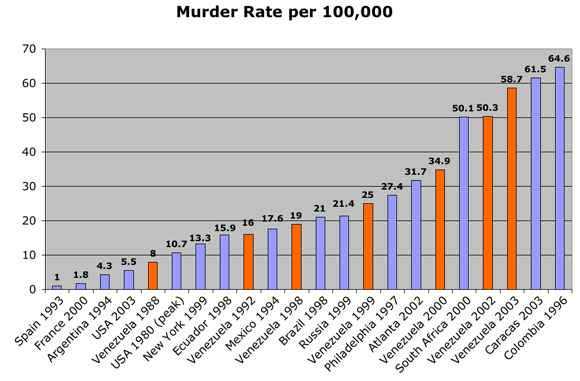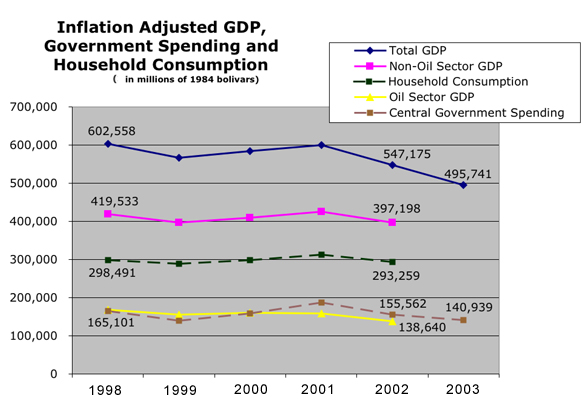Bread and butter issues will decide the referendum
or, Why I still think Chavez will lose
Nobody who spends any time in Venezuela could confuse it with a well-functioning country. Venezuela is increasingly poor, increasingly anarchic, and increasingly violent. According to almost all polls, economic and physical insecurity have long been the central concerns of Venezuelan voters. On both these central issues, the Chavez government has failed calamitously.
Take violent crime. Since 1998, it has reached stratospheric heights. Venezuela and Iraq have roughly the same population. In 2003, there were 13,000 violent deaths in Venezuela, and just under 11,000 civilian deaths in Iraq (according to the anti-war website IraqBodyCount.org.) Venezuela is now the second most murderous country on earth, after Colombia, having left even Serbia, Jamaica and South Africa behind. Statistically, a Venezuelan is far more likely to die violently than an Israeli. The murder rate tripled between 1998 and 2003.

Meanwhile, per capita income has fallen by around 50% over the last 25 years, down to levels not seen since the mid 1950s. Latin American experts speak about the lost decade of the 1980s, but for Venezuela it’s been more like the lost half-century.
The twin scourges of steady impoverishment and rising violence and anarchy had been at play in Venezuelan for two decades by the time Hugo Chavez reached power. Popular anger at the inability of the old regime to deal with them largely explains the electorate’s decision to give Chavez a shot in 1998. After two decades of broken promises, people were understandably hopping mad. Not surprisingly, they voted en masse for the guy with the angriest anti-establishment discourse.
That was six years ago. A cursory glance at the statistics shows that Chavez has failed to even start to make a dent on these two, central, over-riding concerns of the Venezuelan electorate, the kitchen-table issues persistently ranked most important by people in surveys.
In both cases, the problems have grown because the chavista state has failed catastrophically to deal with them. The newly overhauled penal procedure system has systemically failed to come to grips with violent crime – investigations are rare, convictions rarer, prosecutors’ backlogs often involve thousands of cases. The police are undertrained, underequiped, underpaid and easily corruptible, forensic labs barely exist, the state can’t find enough lawyers who meet even basic qualifications to be judges.
Violence hurts Chavez’s core constituency the hardest. The overwhelming majority of the murders happen in barrios (shantytowns), precisely the areas of greatest social exclusion that are supposed to form the backbone of Chavez’s support. Today, the reality is that if you live in a barrio and you kill someone, you can be almost entirely sure you won’t go to jail for it. Shooting is an unremarkable thing, an almost nightly occurrence in many barrios. As a result, law abiding barrio-dwellers simply don’t go outside at night. They live under an effective curfew.
On the economy, the story of a quarter-century decline accelerating in 1998-2004 is quite similar. The economy had been alternating between stagnation and contraction for 20 years leading up to 1998, (except for a brief period of expansion during the government Chavez tried to overthrow.) Aside from the disastrous financial meltdown of 1994, however, Venezuelans had never seen mass impoverishment on the scale they’ve seen under Chavez. At least the 1994 crash was followed by a period of stability and then some moderate growth. Certainly, the sustained rate of impoverishment over the last 6 years is unprecedented. It’s hit every part of the economy, and even the expected dead-cat bounce this year will do little to make up the lost ground.

For most Venezuelans, their personal experience of the economy is of having to work harder and harder for less and less money and less and less security. More Venezuelans now work illegally than legally. (The technocratic euphemism is “informally”, but it means outside the legal framework.) Illegal workers in Venezuela simply have no welfare protections at all, no severance pay, no vacation leave, nothing.
According to a UCAB study, 90% of illegal workers earn less than the legal minimum wage. To work illegally is to be at the mercy of the unrestrained forces of the market, with no institutions to protect you at all. During the revolutionary people’s bolivarian government, for the first time illegal workers have come to outnumber legal ones.
Worse still, out and out unemployment has risen as well. This is particularly alarming in a society where the unemployed typically receive no state aid. Instead, they have to rely on already hard-pressed families to eat, impoverishing their entire households. Given that over half of the nation’s manufacturing industries have gone under in the last 6 years, it’s hardly surprising unemployment has risen sharply.
So on the Big Two issues, on the issues non-ideological voters care most about, Chavez is faring very badly indeed. Chavistas will argue that the opposition is to blame for this decay. But pragmatic voters are uninterested in the blame game: everywhere and always, the party in power pays the price for underperformance. Venezuela will not be an exception.
Governments that make people less secure, whether in their bodies or their pocketbooks, fare badly at the ballot box. No amount of rhetoric can trump the lived experience of deepening poverty and growing fear of violence. You don’t need a statistician to tell you you’re poorer than you were 6 years ago, or that your neighborhood is more violent than it’s ever been. These are things you live, not things you read about.
The dirty little secret here is that many or most of Chavez’s supporters voted for him in 1998 and 2000 because they thought he was going to make their day-to-day lives better. He promised he would, with an energy, a passion and a (seeming) sincerity they’d never seen before in a politician. Today, there are three times as many murders as in 1998. Three times! And less than half as many manufacturing companies! Chavez can call a cadena and talk until the end of time, but those realities are not going away.
The fact – and this is ideologically impossible for the chavistas to understand and accept – is that most 1998 chavistas wanted what most normal people everywhere want. They didn’t want the end of American Imperialism, they didn’t want to re-engineer capitalism. They didn’t want to reorder society from the ground up, or turn PDVSA into a glorious people’s cooperative. They certainly didn’t want to hear long rants against the catholic church, or the president of the US, or the people who owned the stations that make the telenovelas they watch. These things are just boring to them. You can’t eat rhetoric.
Like people everywhere, they just wanted to earn enough money to eat three times a day and send their kids to school. They wanted to be able to walk the streets of their neighborhoods at night without fearing imminent death or maiming. Chavez promised both. He’s delivered neither. That’s why he’ll lose.
Caracas Chronicles is 100% reader-supported.
We’ve been able to hang on for 22 years in one of the craziest media landscapes in the world. We’ve seen different media outlets in Venezuela (and abroad) closing shop, something we’re looking to avoid at all costs. Your collaboration goes a long way in helping us weather the storm.
Donate




